Rebecca Halpern’s revealing and savoury Love, Charlie: The Rise And Fall Of Chef Charlie Trotter features on-camera in-person interviews with Wolfgang Puck, Emeril Lagasse, Grant Achatz, Norman Van Aken, Carrie Nahabedian, Rick Bayless, Della Gossett, Michelle Gayer, David LeFevre, Guillermo Tellez, Reggie Watkins, Rahm Emanuel, Gordon Sinclair, Art Smith, farmer Lee Jones, and Trotter’s ex-wife Lisa Ehrlich.
Rebecca is also the producer of Danny Lee’s Who is Stan Smith?, executive produced by LeBron James (a DOC NYC highlight along with Matt Tyrnauer’s The End Of The World; Marina Zenovich’s Jerry Brown: The Disrupter; Denny Tedesco’s Immediate Family; Laura Poitras’s All The Beauty And The Bloodshed on Nan Goldin; James Lapine’s In The Company Of Rose on William Styron’s wife, and Dawn Porter’s Cirque Du Soleil: Without A Net).
 |
| Rebecca Halpern with Anne-Katrin Titze on Charlie Trotter’s: “His vegetarian dishes were beautiful and multi-layered and nuanced and remarkable.” |
I spoke with Chef Mauro Colagreco (featured in Vérane Frédiani and Franck Ribière’s Reinventing Mirazur) earlier this year during the Tribeca Film Festival about his decision to use the Lunar Calendar to shape the daily menu for his three-Michelin-star winner of Best Restaurant in the World in 2019, Mirazur. Vegetables loomed large for Charlie Trotter as well. Both chefs share a love of literature, which might be a major secret ingredient for being chosen among the most formidable restaurants in the world. The power of storytelling through food should not be underestimated.
Trotter, the man who brought us microgreens and the “kitchen table” experience is explored with all his idiosyncrasies as he embarked on his exhaustive quest for excellence. We learn that he was a “very active child” and his first wife speaks about his “heavy partying” in college, that he played Ayn Rand tapes on the car radio, and that her roommate at first thought she was being stalked by Chuck, whose incessant letters seemed equal parts flattering and alarming.
A visit to Alice Waters’s Chez Panisse very much inspired the budding chef and with his opening of Zelda, his restaurant named after F Scott Fitzgerald’s wife, who reportedly struggled with mental health, his shift in identity was well on its way. Exit Chuck, enter Charlie. Obsession, though, persisted as he at times would sleep in his dining room to prepare for the day ahead. In archival footage we see him screaming at a woman about peaches and in a clip from P.J. Hogan’s movie My Best Friend’s Wedding, starring Julia Roberts, he is seen parodying himself. The pressure of Michelin stars, a cruel streak, a talent for observing people, his abhorrence of anything mediocre, and his untimely death in 2013 feed into this one-of-a-kind portrait.
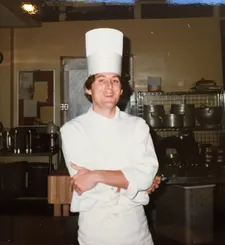 |
| Rebecca Halpern on Chef Charlie Trotter: “He was tired of mesclun, for example. What did he do? He worked with farmer Lee Jones to invent microgreens.” Photo: courtesy of Greenwich Entertainment |
From Los Angeles, Rebecca Halpern joined me on Zoom for an in-depth conversation on Love, Charlie: The Rise and Fall of Chef Charlie Trotter.
Anne-Katrin Titze: Hi!
Rebecca Halpern: Hi Anne-Katrin!
AKT: Nice to meet you Rebecca. Where are you?
RH: I’m in Los Angeles.
AKT: I just spoke, about 20 minutes ago, with Marina Zenovich who made a documentary about California’s former Governor, Jerry Brown. On to Charlie Trotter - you title the film Love, Charlie - like a sign off. When I looked at my notes, the first thing I jotted down from your film was the quote “Basically I hate people.” So love and hate - it’s a film of extremes?
RH: Oh that’s interesting! I actually did never think of it that way. That’s clever. Why did we call it Love, Charlie? Well, people think Charlie Trotter is a perfectionist, but he would say that’s wrong. Perfectionism is about the outcome, it’s boring.
Excellence is about the process. And to Charlie excellence equates to the care and the love that you pour into everything that you do. Whether it’s how you take out the trash or how you plate a beautiful dish, there is no difference. Excellence is about process, so for us Love, Charlie was really the essence of what he meant by excellence. And you see it not just in his cooking, but in the film you see it in his postcards and letters too that he wrote to all of the friends and loved ones.
AKT: And especially those to his ex-wife, whom you have in the film. I was wondering how it would have had felt for him to have an ex-wife commenting on his life.
RH: I can’t answer that question and neither can he.
AKT: Obviously.
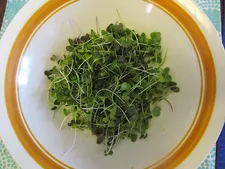 |
| Microgreens, courtesy Anne-Katrin Titze Photo: Anne-Katrin Titze |
RH: Not to be too morbid, but what’s interesting about Lisa is that they had a really deep soulful connection, the kind of connection I don’t think he had with his other spouses in his life. They met when they were still in college. Before Charlie Trotter opened a restaurant everybody knew him as Chuck.
And he wrote hundreds of postcards and letters to Lisa and other people in his life as he was trying to form his philosophy on food, on dining and on just life in general. To me Lisa and her presence in the film is less about them and their relationship and more about giving us a glimpse, an access point to Chuck, which we argue in the movie was his authentic self.
AKT: There is a switch, now there is no more Chuck, it’s a different person. The possibility of reinvention and at the same time what is left behind - I thought that was interesting.
RH: Thank you, yes, Chef Charlie Trotter in many respects was a role that he had to play in order to help his establishment become a success. And when you play the same role for 25 years, it’s easy to understand how someone might lose sight of themselves. When the restaurant closed, so did Charlie. And he didn’t have a second act after that and he passed away a year later.
AKT: The background is also interesting. He doesn’t come from a restaurant family, his mother had, I think you say in the film, eight dishes that she made. Very different from many famous chefs. I spoke during the summer [at the Tribeca Film Festival] to Chef Mauro Colagreco of Mirazur and asked him about a favourite dish his mother made. And he went into how much he loved her gnocchi. It is a big thing, a nostalgia, that comes with it. And none of that seemed to have been there with Charlie Trotter.
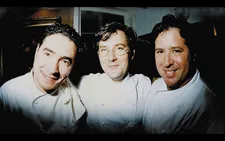 |
| Chefs Emeril Lagasse, Charlie Trotter and Norman Van Aken Photo: courtesy of Greenwich Entertainment |
RH: He was a wunderkind and an outlier in his family and in the world. People didn’t understand him because he was so different; he definitely had eccentric tastes and was really intellectual in a way that not many people in the world are. He loved very challenging films like Fitzcarraldo by Werner Herzog. And he loved books by people like Ayn Rand, which are not that popular frankly.
AKT: No, definitely not.
RH: He was not a mainstream person and he wasn’t for everyone. In his kitchen there were chefs who showed up and realized very quickly that it wasn’t the place for them and there were chefs who felt they could be their best selves working with Charlie, that he pushed them the right way. There’s apples and oranges, that’s why they make different flavours of ice cream.
AKT: Just naming a restaurant after Zelda Fitzgerald - that in itself proves the point that you just made. It could have been called Fitzcarraldo.
RH: Ha, what’s interesting about Fitzcarraldo and we had to leave this on the cutting room floor, was something I wanted to add but it was just too esoteric. You know, he would stop service in the middle of the afternoon and force his team to watch Fitzcarraldo, which is by the way, a three-hour-long movie about a very obtuse subject matter.
AKT: Indeed.
RH: Where this guy tries to get these Indigenous people in the Amazonian jungle to foist a steamship, like a barge up over a mountain. And in many respects I think it was a metaphor for what Charlie was trying to do in the kitchen. And he used that to show them. You can see why we couldn’t include it in the film, it’s just a very long explanation.
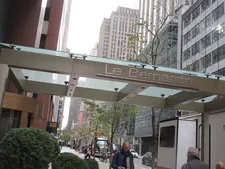 |
| Co-founder Maguy Le Coze and chef and partner Eric Ripert’s Le Bernardin celebrates its 50th anniversary this year Photo: Anne-Katrin Titze |
AKT: It fits in perfectly with what you do explain about Charlie. Chef Grant Achatz [who used to work for Trotter] - Trotter, I think called his restaurant “nonsense on stilts”?
RH: Charlie called his restaurant “nonsense on stilts”, yeah. I mean when molecular gastronomy had come along, no one had ever seen it stateside. El Bulli was doing it obviously in Spain. In the United States it was so new. It was in the Nineties, or early 2000s I should say. You had Cirque du Soleil and then you had molecular gastronomy and in Charlie Trotter’s mind that’s what molecular gastronomy was. The Cirque du Soleil of food. The question that Carrie Nahabedian poses in the film - will Grant be around as long as Charlie will be around? Will his food stand the test of time?
AKT: It’s funny that you mention Cirque du Soleil. Right now at DOC NYC Dawn Porter has a film on Cirque du Soleil [Without a Net]. Have you seen it?
RH: I have not, but I have a film at DOC NYC right now, It’s called Who is Stan Smith? about Stan Smith the tennis player and sneaker icon, but we can talk about this some other time.
AKT: Definitely. This brings me to tennis and food. How did Charlie Trotter enter your head? Why this film?
RH: I didn’t develop this movie, I was only invited to the party, which was a very lovely invitation. My mother was a food writer in Chicago in the 1980s and 90s. I grew up in the same hometown as Charlie and went to the same high school. So I understand the world, I knew what the public’s perception of him was and I came at it from a decidedly humanistic perspective. Whereas I think other directors that came up for the project were more interested in the food side of things.
I just wanted to get to the heart of who this enigmatic chef was. And thanks to Lisa and her postcards, thanks to the home videos that we have from the family, thanks to so many chefs and friends and loved ones of Charlie’s we were able to paint what I think is an authentic, textured, multi-layered portrait of a very complicated person.
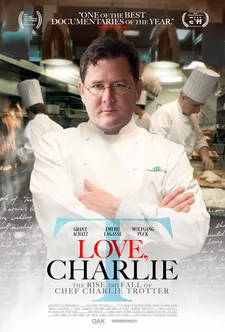 |
| Love, Charlie The Rise And Fall Of Chef Charlie Trotter poster |
AKT: That is the man and you also bring up all his innovations, such as the “kitchen table”. I had no idea that he invented that. A friend of mine [Jennifer Penson, then Berenson, who also provided the cakes for Rob Reiner’s The American President, starring Annette Bening and Michael Douglas, screenplay by Aaron Sorkin] from Paris was a pastry chef and she worked at Le Bernardin in the Nineties.
When I visited her in the kitchen of Le Bernardin, I will never forget it, they sat me on top of the refrigerator and they gave me food to taste. It was a great experience, sitting there in this fabulous restaurant being fed what they were making. It makes so much sense and he [Trotter] had to come up with the kitchen experience!
RH: You know what I love about what you just told me? One of the things I wanted the film to do is to spark people’s own remembrances of their food experiences. The seminal moments in their own dining life and the nostalgia factor in this movie is strong. And it will spark conversations and memories and inspiration. I love that you were so emotional telling me that story right now. That’s the point.
AKT: It is, especially when it concerns food. Vegetables - being vegetarian, being vegan has this bizarre stigma in this country which is really pretty insane.
RH: Charlie Trotter thought that vegetables should have just as much a seat at the table as meat or fish or poultry. He went so far as to do a couple of vegetarian cookbooks that he either wrote himself or contributed to. And his vegetarian dishes were beautiful and multi-layered and nuanced and remarkable. And the ingredients that he was using weren’t just run-of-the-mill vegetables. He introduced things like quinoa into the broader conversation.
He also was extremely innovative in terms of his plating, in terms of the composition of his dishes and he worked very closely with his purveyors, including a farmer whom we feature in the film, farmer Lee Jones. To innovate and create new kinds of vegetables. He was tired of mesclun, for example. What did he do? He worked with farmer Lee Jones to invent microgreens. Now you can’t go to any mid-level or higher or sometimes even fast-casual restaurants and not get a dish that has a microgreen of some kind on it.
AKT: Very true.
RH: That’s Charlie Trotter! His influence is everywhere and he deserves to be remembered.
 |
| Quad Cinema in New York Photo: Anne-Katrin Titze |
AKT: You interviewed Wolfgang Puck, who calls him a control freak.
RH: I think Charlie wouldn’t mind that. He was smart. This is what Wolfgang was getting at, Charlie financed everything - his restaurant, his cookbooks, his television show. He financed all of his sauces and other things. Why? Because then he could control them himself. He could do it all himself, that’s just smart business in a way. Because nobody wants to be beholden to anyone else. On the other hand it showed that he had an ego and probably a too healthy belief in his own abilities. Nobody got anywhere questioning themselves in life, right?
AKT: You also bring up the cruel streak. It all makes sense, a person emerges after seeing your film. Thank you for taking the time!
RH: Thank you so much!
Love, Charlie: The Rise And Fall Of Chef Charlie Trotter at the Quad Cinema in New York on Sunday, November 20 following the 4:10pm screening a Q&A with Rebecca Halpern, Chef Wyle Dufresne, and Trotter food lover and executive producer Ray Harris, and Monday, November 21 following the 7:15pm screening a Q&A with Rebecca Halpern, Chef Daniel Boulud, and Ray Harris.






















